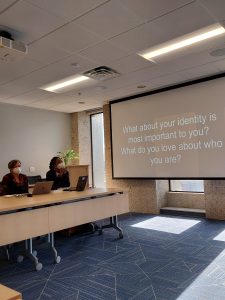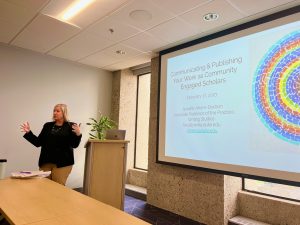Spring 2023 events
Collaborations with Artist-Educators: The 2022 Durham School of the Arts Fall Festival
In Fall 2022 Durham School of the Arts held its 11th Annual Fall Art Festival, Día de los Muertos. The Festival, founded and co-directed by DSA visual art teacher Amber Carroll Santibañez, creates a space to honor and celebrate ancestors, families, and communities while also encouraging students to reflect on their own legacies and the ancestors they will become. Since 2018, the Forum for Scholars and Publics has provided support, in various forms, for the festival. In this session, Santibañez and Lou Brown will discuss the processes and products of their collaboration, including an exploration of the challenges, opportunities, and payoffs of working across vastly different institutional and personal structures and norms.



It Takes a Village: Welcoming Refugees to Durham Through Community-Engaged Partnership
In this candid conversation, CWS Director Ellen Andrews and Duke Professor Deb Reisinger talk about the benefits and challenges of working with student volunteers. Andrews and Reisinger have worked together for 10 years, supporting refugee resettlement efforts and service-learning opportunities for students. This year, they are participating together in the Community engaged Scholarship Collaborative in order to explore the impact of student volunteerism on community partners.
A Community-Academic Partnership to Advance Health Equity in the Latinx Community: Key Strategies and Lessons Learned
This Lunch and Learn discussed the history of a community-academic partnership between El Centro Hispano and Duke University School of Nursing to address health and equity in the Latinx community. Examples were highlighted to demonstrate how principles of community engagement were operationalized in this partnership and key lessons learned. Presented by Rosa Gonzalez Guarda and Pilar Rocha-Goldberg.
Publishing and Communicating Your Work as Community-Engaged Scholars
This workshop helped scholars identify potential outlets and publishing strategies for disseminating their teaching, research, or practice findings in community-engaged work. Individual scholars, pairs or groups of Duke-community partners were encouraged to participate. Workshop included discussion of potential challenges and promising practices in this type of collaborative writing and publishing. Facilitated by Jennifer Ahern-Dodson.

Community-Engaged Scholar Writing Retreat
Community-engaged scholars across North Carolina gathered to set aside time for writing, in community. This retreat included directed writing time, optional individual breakout consultation sessions, and mini-workshops on writing strategies. Participants had the opportunity to sign up for a consultation session a few days before the retreat. This event was sponsored by North Carolina Campus Engagement and co-sponsored by Duke Civic Engagement. See highlights from last year’s retreat.
Environmental Health and Justice: Example of a University-Community Partnership and Learning platform in Eastern Coastal NC
This Lunch & Learn described one example of a University-Community partnership created by Duke faculty Sumi Ariely and Diana Silimperi, and built through sustained collaboration with students and partners in Pamlico County, NC. The team, featuring students Nick Haddad and Advika Kumar, Pamlico Partner Bob Fuller, and Diana and Sumi shared insights on the on-going development, methods and outcomes of their collaborative work around environmental health. Challenges, lessons learned, and next steps were discussed, engaging the audience in a rich discussion to understand how such partnerships can be created and sustained ethically and efficiently. Presented by Sumedha Ariely, Robert Fuller, Diana Silimperi, Nick Haddad and Advika Kumar.
Ethical Engagements in Community-Based Knowledge Production
This session was for those from Duke and their community partners who are working together to produce knowledge, whether through academic research, program evaluation, community-student learning opportunities or a combination of these and other methods. The workshop explored questions and practical tips or putting structures and processes in place in order to ensure that knowledge is co-generated, shared and disseminated in ways that are ethical and just. Facilitated by Elizabeth Shapiro-Garza and Sumi Ariely.
Fall 2022 events:
Community-Engaged and Community-Partnered Research
Engaging and partnering with community members and entities in research, sometimes in the form of research practice partnership, can be a powerful mechanism for ensuring research is appropriately situated within the context and utilized for social change. These concepts and processes are highly complex, and often quite challenging, both in theory and in practice. This session will introduce the meaning of “community-engaged research” and related terms, explore their relevance for both researchers and communities, and consider recommendations for enacting best practices. In partnership with the Social Science Research Institute (SSR).
Engaged Scholars Lunch & Learn: Who’s Your People: Fostering Meaningful Engagement with Indigenous Communities in North Carolina and Beyond.
View the event recording here.
Donna Chavis and Ryan Emanuel sit in conversation about their individual and shared experiences partnering with tribal institutions and communities. Donna, a Lumbee elder, has deep roots in community organizing and advocacy around social and environmental issues. Ryan, also Lumbee, works within academia to amplify Indigenous perspectives on the environment. Their conversation will cover engagements with tribal governments and other institutions as well as the need for respect and reciprocity.
Community-Engaged Scholar Writing Retreat.
Community-engaged scholars across North Carolina gathered to set aside time writing while in community. It was facilitated by Jennifer Ahern-Dodson (NC Engaged Scholar 2018-2019) and included directed writing time, individual breakout consultation sessions and mini workshops on writing strategies.
Spring 2022 events:
Community-Engaged Scholarship Symposium
The Community-Engaged Scholarship Symposium was a free, virtual event created to highlight the work of successful community-academic partnerships and serve as a platform for networking and information sharing among community-engaged scholars from the Duke University and Health systems and their partner organizations.
View information from this past event HERE.
Community-Engaged Scholars Writing Retreat
During two workshops in the Spring, scholars and partners from Duke and Durham came together for dedicated time to write, learn and connect at the Community-Engaged Scholar Writing Retreat. The event was facilitated by Jennifer Ahern-Dodson, Associate Professor of the Practice in the Thompson Writing Program and Director of Duke Faculty Write Program, and was sponsored by the Community-Engaged Scholarship Collaborative. The three-hour event included time to for participants to write, collaborate, consult and learn. The session ended with a workshop on practical strategies to improve work/life balance in writing projects.
LATIN-19: A Successful Model of Bi-directional Multi Sector Collaboration
During this event, members and collaborators in LATIN-19 shared with the audience their work, experiences, lessons learned, successes and barriers while working together during the last two years.
Community-Engaged Scholarship Collaborative Information Session
The Fellowship in Community-Engaged Scholarship Collaborative is for Duke faculty, staff and community partners who are interested in furthering their engaged practice and projects. The Fellowship program offers structured, holistic, developmental support, learning opportunities and project funding over the course of the school year. Watch the information session from the 2022-2023 application cycle.
Academia and Philanthropy: A Collaborative Approach to Food Insecurity
Gideon Adams (Food Bank of Central & Eastern NC) and Dr. Norbert Wilson (Duke Divinity School) lead a presentation on the evolving services of food banking and shared learners with academic partners.
Fall 2021 events:
Just Collaboration: Asset and Systems-Based Approaches to Community Partnership
Presentation by Camryn Smith (Communities in Partnership) and Kay Jowers (Nicholas Institute)
Communities in Partnership (CIP) is a community accountable organization founded and led by those most impacted by structural racism. CIP works to address social determinants of health in East Durham through interconnected food sovereignty, entrepreneurship and workforce development, affordable housing, and leadership development programs. This presentation offers perspectives on how institutional partners can use asset- and systems-based approaches to engaging with community and discuss the range of engagement strategies CIP and its university partners use to create just community-based research partnerships.
Cemetery, Community, Classroom Collaborations between Duke and the Friends of Geer Cemetery
Presentation by Debra Taylor Gonzalez-Garcia (President, Friends of Geer Cemetery), Nyrobi Manuel (Story+ Researcher) and Adam Rosenblatt (Associate Professor of the Practice in International Comparative Studies).
Located two miles from Duke’s campus, Geer Cemetery was founded in 1877 by members of Durham’s African American community and is both a sacred place and an archive of Durham history that has suffered institutional neglect lasting through the Jim Crow era to the present day. The Friends of Geer Cemetery is a nonprofit working to restore the cemetery’s grounds and research its histories. A 2020 service-learning course, “Death, Burial, and Justice in the Americas,” partnered with the organization to research the lives of people buried at Geer. The following summer a Duke Story+ program further explored issues of labor and African American burial networks, including local funeral homes. This presentation offers perspectives from a community leader, professor, and student involved in project, revealing how community engagement at Duke can widen to incorporate the marginalized dead.
Resources for Community Engaged Scholarship at Duke
Campus partners present information on community-engaged scholarship resources, support or funding offered through their programs, offices or units. Campus partners participating include Duke Faculty Write, Duke Service-Learning, CTSI, Forum for Scholars and Publics, DGHI, SSRI, Duke Civic Engagement, Bass Connections and +Programs, and DukeEngage.


